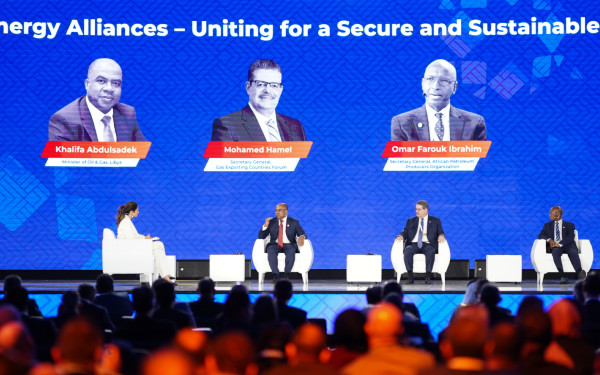
Libya is setting its sights on boosting oil production to 2 million barrels per day (bpd) within the next two to three years, with brownfield development and local investment identified as critical drivers of this growth. Speaking at the Libya Energy&Economic Summit (LEES) in Tripoli on Saturday, Minister of Oil and Gas Dr. Khalifa Abdulsadek outlined the country’s strategy to reach 1.6 million bpd by year-end and laid the groundwork for longer-term growth.
“There are massive opportunities here, massive fields that have been discovered, but a lot of fields have fallen between the cracks,” stated Minister Abdulsadek during the Ministerial Panel, Global Energy Alliance – Uniting for a Secure and Sustainable Energy Future. “We want to make sure local oil companies take part. We also want to leverage the upcoming licensing round to support our planned growth in the oil sector.”
The minister’s remarks were complemented by a strong call for international participation in Libya’s upcoming licensing round, signaling the government’s commitment to fostering collaboration and maximizing the potential of its energy sector.
Highlighting Libya’s vast natural gas potential – with reserves of 1.5 trillion cubic meters – Mohamed Hamel, Secretary General of the Gas Exporting Countries Forum, stressed the need for enhanced investment in gas projects. He pointed to ongoing initiatives like the $600 million El Sharara refinery as opportunities to stimulate economic diversification.
“Natural gas is available,” Hamel stated, adding, “It is the greenest of hydrocarbons and we see natural gas continuing to grow until 2050.”
The panel also tackled the global energy transition, emphasizing Africa’s unique challenges and the need for the continent to harness its resources to achieve energy security. Dr. Omar Farouk Ibrahim, Secretary General of the African Petroleum Producers Organization (APPO), underscored the critical need for finance, technology and reliable markets to drive progress.
“At APPO, we have noted three specific challenges for the African continent. Finance, technology and reliable markets,” he stated, questioning whether Africa can continue to depend on external forces to develop its resources.
As one of Africa’s top oil producers, Libya holds an estimated 48 billion barrels of proven oil reserves. The country’s efforts to expand production, attract investment and drive innovation are central to the discussions at LEES 2025. Endorsed by the Ministry of Oil and Gas and National Oil Corporation, the summit has established itself as the leading platform for driving Libya’s energy transformation and exploring its impact on global markets.
Distributed by APO Group on behalf of Energy Capital&Power.


